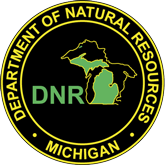| Contact: Joanne Foreman, 517-284-5814, or Sue Tangora 517-420-0128
Wherever your travels may take you this summer, you can make more room for your favorite recreational gear, your pet or even an extra friend by choosing to leave firewood at home.
Moving firewood when you camp, hunt or head out for a weekend getaway means you risk carrying tree-killing insects and diseases inside the firewood. Bugs can crawl out, infesting trees and carrying diseases that can forever change the landscape of the places you love.
 “Much like the emerald ash borer – which spread across the state in the early 2000s, killing many of Michigan’s 700 million ash trees – invasive oak wilt, beech bark disease and hemlock woolly adelgid are threatening tree species that are critical components of our forests and landscapes,” said Robin Rosenbaum, Michigan Department of Agriculture and Rural Development Plant Health Section manager. “Much like the emerald ash borer – which spread across the state in the early 2000s, killing many of Michigan’s 700 million ash trees – invasive oak wilt, beech bark disease and hemlock woolly adelgid are threatening tree species that are critical components of our forests and landscapes,” said Robin Rosenbaum, Michigan Department of Agriculture and Rural Development Plant Health Section manager.
According to MDARD, there are 140 pests and diseases that can be moved with firewood. Some are already present in Michigan, while others, including Asian longhorned beetle, beech leaf disease and spotted lanternfly, are infesting nearby states.
“On their own, these insects and diseases can’t travel very far, but they can travel hundreds of miles on firewood,” said Sue Tangora, Michigan Department of Natural Resources Forest Health and Cooperative Programs Section supervisor. “Trees cut for firewood often died due to insects or disease. Why risk carrying oak wilt to your cabin or beech bark disease to your favorite camping spot?” |
Keep the fire burning
You can still have a roaring campfire, or a cozy night in front of the fireplace, if you just know how to burn safe.
- Wood that looks clean and healthy can still have tiny insect eggs or microscopic fungi spores that can start a new and deadly infestation. Always leave your backyard firewood at home, even if you think it looks fine.
- Buy firewood near where you will burn it – a good rule of thumb is only using wood that was cut within 50 miles of where you’ll have your fire.
- Use FirewoodScout.org to find a firewood vendor near your destination. With over 350 Michigan listings, you can comparison shop before you arrive.

- Certified, heat-treated firewood is safe to move long distances. Look for a federal stamp or seal on the package, and keep the firewood in the original packaging if entering a campground that requires heat-treated wood.
- Aged or seasoned wood is still not safe. Just because it is dry doesn’t mean it’s clean. A recent study showed insects continued to emerge from firewood even three years after it had been cut.
- If you buy firewood and don’t burn it all, don’t bring it home or to your next destination.
- Tell your friends not to bring wood with them – everyone needs to know they should not move firewood.
|
Know before you go
Firewood policies vary greatly among the national parks, national forests, private campgrounds and other lands in Michigan. Call ahead or visit DontMoveFirewood.org for more information.
 In state parks, the DNR requests visitors purchase certified, heat-treated firewood sold in the parks or at some local stores and roadside stands. In state parks, the DNR requests visitors purchase certified, heat-treated firewood sold in the parks or at some local stores and roadside stands.
For cross-country travels, be mindful of state and federal quarantines that may prohibit the movement of firewood or certain wood products. The Nature Conservancy provides information on rules for U.S. states, Canadian provinces and Mexico at DontMoveFirewood.org/Map. |
Find out more
Tuesday, May 25, at 9 a.m., Michigan’s NotMISpecies webinar series features “Dynamite! And other tools to protect Michigan’s state park trees,” exploring how and why tree health is a critical component of state park management. Learn about the variety of tools, including explosives, used to control invasive insects and diseases to keep the forest ecosystem intact and ensure you have a great recreation experience. Register for the webinar at Michigan.gov/EGLEEvents under “Featured Webinar Series.”
Information on invasive tree pests and diseases of concern in Michigan can be found at Michigan.gov/Invasives.
Michigan’s Invasive Species Program is cooperatively implemented by the Department of Environment, Great Lakes, and Energy, the Department of Natural Resources; and the Department of Agriculture and Rural Development.
/Note to editors: Accompanying photos are available below for download. Suggested caption information follows.
Certified: A certification stamp and the name and address of the firewood supplier should be visible on any certified firewood label. Photo courtesy of the U.S. Army Corps of Engineers.
Buy-burn: To prevent spreading invasive pests and diseases, buy firewood near or at your destination.
Hoffmaster: Hundreds of trees have been removed from the campground at P.J. Hoffmaster State Park in Muskegon due to an infestation of oak wilt./ |





